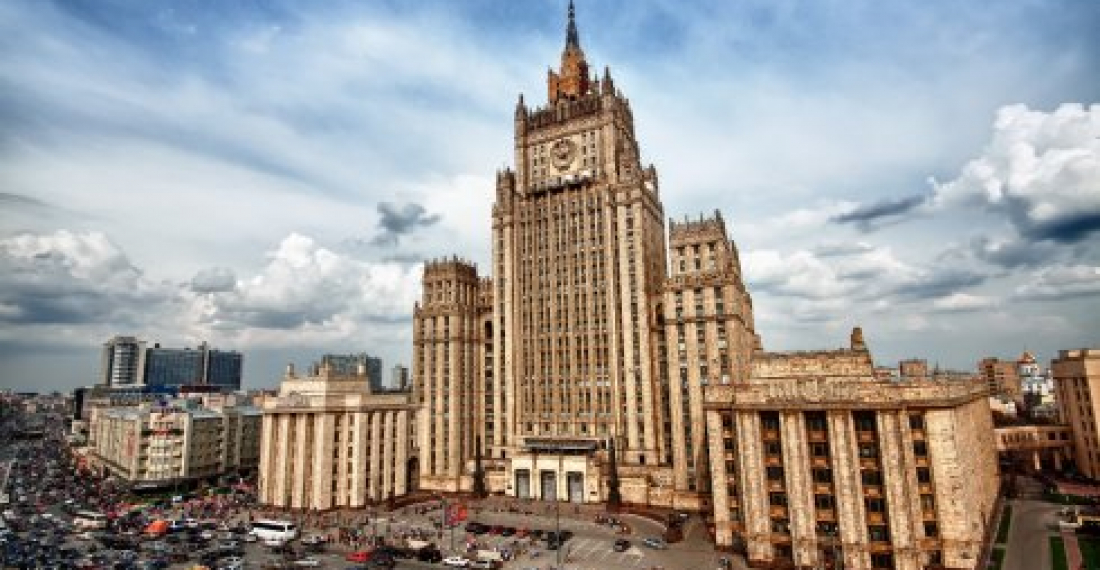The Russian Foreign Ministry on Friday (30 December) issued a short terse statement on the ongoing incidents on the border between Armenia and Azerbaijan, urging the sides to abide by the cease-fire. The statement also distanced the Russian position from the comments of CSTO Secretary-General the previous day.
In its statement the Russian Foreign Ministry stated,
"According to information, clashes have occurred on the Armenian-Azerbaijani border. Casualties are reported among the troops on both sides. We express our condolences to the families who lost their loved ones. We urge the parties to continue adhering strictly to their obligations to maintain the ceasefire and immediately take all necessary steps to stabilize the situation.
As for the statement of Secretary General of the Collective Security Treaty Organization, the position of the CSTO member states on the Nagorno-Karabakh conflict is clearly expressed in their joint statement in Yerevan on October 14, 2016".
Earlier, the Azerbaijani government strongly criticised comments made by CSTO Secretary General Nikolay Bordyuzha, and particularly his reference to the self-declared Nagorno-Karabakh Republic. In its statement on Thursday the CSTO Secretariat said that it was concerned about information it had received about an incident "near the Chinari region of Armenia".
"We assess such actions in the territory of a CSTO member state as a provocation, especially against the backdrop of the quite serious incident in the Nagorno-Karabakh Republic, in April of this year, with the use of heavy weapons and military equipment.
Considering the efforts launched by the leaders of the two [conflicting] sides as well as of some [other] states, it seemed that the Karabakh conflict settlement process finally would be more active. However, the information being recently received from the region, [and] about the violation of the ceasefire agreements, especially the December 29 incident which has caused the death of military servicemen, gives rise to serious concern".
In its response on Friday, the Azerbaijani Foreign Ministry claimed that Bordyuza had distorted the essence of the incident by alleging that it took place on the territory of Armenia. and that reference to the "Nagorno-Karabakh Republic" was an attempt to question the territorial integrity, sovereignty and internationally recognised borders of Azerbaijan.
"This irresponsible statement made by the CSTO secretary general undermines the negotiation process on the settlement of the Armenia-Azerbaijan Nagorno-Karabakh conflict, mediated by the OSCE Minsk Group, as well as runs contrary to the fundamental principles of relations with other member states of the organization supporting Azerbaijan's sovereignty and territorial integrity," the ministry added. The Azerbaijani foreign ministry rejected Bordyuzha's statement, calling on other CSTO countries to comment on it.
On their part, Armenian officials and commentators have welcomed Bordyuzha's statement describing it as significant.
Commonspace.eu political editor said that apart from the military situation on the ground the current situation is clearly starting to cause stresses within Russian led organisations such as the CSTO and the Eurasian Economic Union, and there have been already a number of examples of this in the last year. What has happened in recent days, on the diplomatic, as well as the military fronts, escalates the problem. Whilst Armenia is a full member of both the CSTO and the EEU, Azerbaijan is a member of neither. But a number of CSTO and EEU member states are reluctant to be dragged into a pro-Armenian position. It is not clear if the CSTO statement on Thursday was trying to send a message, or was simply a badly drafted statement, but it has certainly touched a raw nerve. On its part, Moscow has to walk on a thin line in order both to keep solidarity within the institutions that it patronises, and to safeguard its own interests which at the moment are best served by not alienating Azerbaijan, whilst keeping Armenia firmly in the fold. This is yet another example of how the Karabakh conflict has become a significant regional and international problem, and can no longer be regarded as a parochial dispute."
source: commonspace.eu with APA (Baku) news.am (Yerevan) and other agencies
photo: The Russian Foreign Ministry building in Moscow (archive picture)






